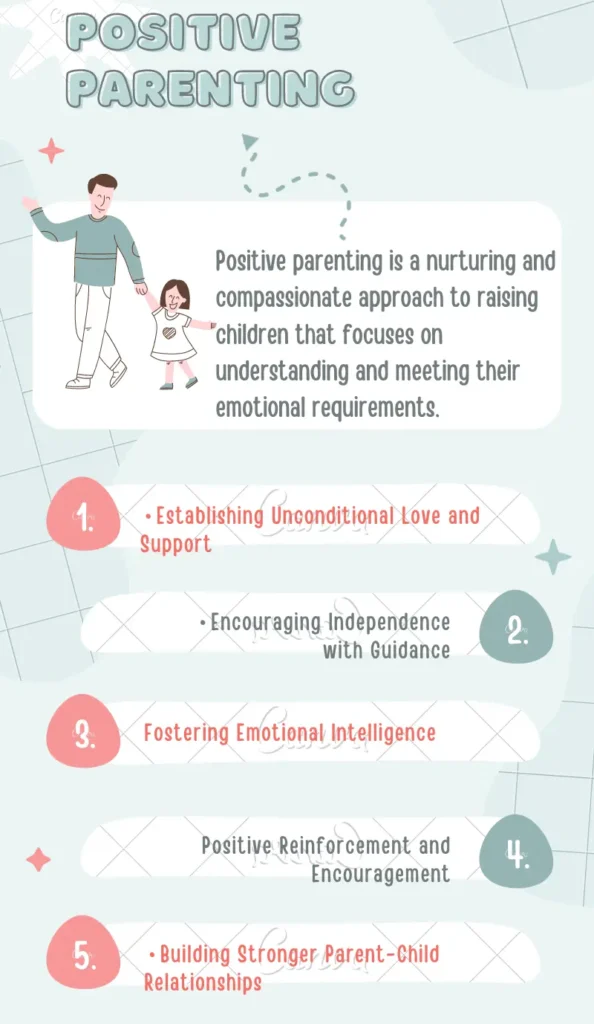Parenthood is a trip filled with joy, challenges, and endless literacy openings. Every parent strives to raise happy, confident, and well- acclimated children. One approach that has gained significant attention and admiration in recent times is Positive Parenting Techniques. In this composition, we will explore the principles and benefits of positive parenthood, offering practical tips and perceptivity to help you foster a nurturing terrain that promotes emotional intelligence, strengthens parent- child bonds, and cultivates healthier family dynamics.

Introduction to Positive Parenting Techniques
What is Positive Parenting?
Positive parenting is a nurturing and compassionate approach to raising children that focuses on understanding and meeting their emotional requirements. It’s a style of parenthood that emphasizes collective respect and open communication between parents and their children. Unlike traditional authoritarian or permissive parenthood styles, positive parenthood aims to produce a loving and probative terrain where children feel safe, valued, and understood.
Understanding Child Development
Before delving into the intricacies of positive parenting, it is crucial to understand child development. Children go through various stages of growth, each accompanied by unique challenges and needs. From the formative years of toddlerhood to the rebellious teenage phase, comprehending child development helps parents tailor their approach accordingly.
The Pillars of Positive Parenting Techniques
Establishing Unconditional Love and Support
One of the fundamental pillars of positive parenting is unconditional love and support. Children thrive in an environment where they feel loved, cherished, and accepted for who they are, irrespective of their strengths and weaknesses. Expressing affection and offering encouragement can significantly impact a child’s self-esteem and overall well-being.
Practicing Effective Communication
Communication is the cornerstone of any healthy relationship, including the one between parents and children. Positive parenting emphasizes active listening and empathetic communication. By genuinely understanding a child’s emotions and thoughts, parents can build a stronger connection and resolve conflicts more effectively.
Setting Clear and Consistent Boundaries
While positive parenting encourages a nurturing environment, it also recognizes the importance of boundaries. Clear and consistent boundaries provide children with a sense of structure and security. By setting reasonable limits, parents can help their children develop self-discipline and responsible decision-making skills.
Encouraging Independence with Guidance
Encouraging independence is a vital aspect of positive parenting. Allowing children to make age-applicable choices and opinions nurtures their sense of autonomy and tone- confidence. Parents act as attendants, offering support and advice while empowering their children to explore the world around them.
Fostering Emotional Intelligence
Emotional intelligence plays a pivotal part in a child’s social and emotional development. Positive parenthood teaches children to fete and manage their feelings, as well as empathize with others. This foundation of emotional intelligence equips children to make healthier connections and manage with life’s challenges more effectively.
The Benefits of Positive Parenting Techniques
Building Stronger Parent-Child Relationships
Positive parenting strengthens the bond between parents and their children. When children feel loved, admired, and supported, they’re more likely to trust their parents and entrust in them during times of joy or torture. This open communication fosters a deeper understanding of each other’s passions and perspectives.
Nurturing Self-Esteem and Confidence
By furnishing unconditional love and stimulant, positive parenthood boosts children’s tone- regard and confidence. When children believe in their capacities and worth, they’re more willing to take on challenges and explore their interests without fear of failure.
Reducing Behavioral Issues
Positive parenting emphasizes positive reinforcement and effective communication rather than punitive measures. This approach reduces the likelihood of aggressive or defiant behavior in children. Instead, children learn to express themselves constructively and develop a sense of responsibility for their actions.
Creating a Positive Learning Environment
In a positive parenting environment, children feel safe to explore and learn. When they are not afraid of harsh punishments or criticism, they are more inclined to take risks and engage in activities that promote their cognitive and creative development.
Promoting Mental and Emotional Well-being
Emotionally attuned parenthood contributes to a child’s internal well- being. When parents validate their child’s feelings and offer support during grueling times, it helps make adaptability and managing chops, enabling children to navigate life’s ups and campo more effectively.
Read also: The Ultimate Guide to Triple P- Positive Parenting Programs
Effective Positive Parenting Techniques
Active Listening and Empathy
In the realm of positive parenting, there exist two bedrocks of paramount importance – active listening and empathy. Taking the time to genuinely apprehend your offspring’s ruminations and emotions can wield profound influence over their emotional well-being. When your progeny articulates their innermost thoughts, make a concerted effort to apprehend their standpoint devoid of any preconceived judgment. Empathy, acting as a validating force, signals their emotions find resonance, affording them the assurance of being heard and understood, thus sowing the seeds of trust in the sacred parent-child bond
Setting Clear and Consistent Boundaries
In the fertile grounds of clearly defined boundaries, children bloom with certainty and fathom the ramifications of their actions. Positive parenting, with its nurturing essence, hinges upon employing gentle guidance and elucidations to help the young ones assimilate the raison d’être behind established norms, eschewing the path of punitive measures. This approach instills within them the quintessence of self-discipline and nurtures a profound sense of accountability.
Praise and Encouragement
Bestowing accolades and commendations upon your children’s endeavors and accomplishments constitutes an enchanting catalyst for bolstering their self-esteem and self-assurance. Instead of tethering the celebration solely to outcomes, elevate the jubilation to encompass the arduous journey and unwavering tenacity they exhibit during their pursuits. In times of adversity, a wellspring of encouragement kindles the flame of resilience and cultivates a buoyant outlook towards conquering obstacles.
Positive Discipline Strategies
Discipline, a defining facet of parenting, assumes a higher form in positive parenting, where its purpose transcends mere punishment. The pedagogy of positive discipline eschews the transient efficacy of time-outs and severe sanctions, opting instead for the tutelage of natural consequences and cogent problem-solving dialogues. This harmonious approach bequeaths children with invaluable lessons from their errors, empowering them to tread the path of sound judgment.
Quality Time and Bonding
An invaluable tapestry of emotional bonds materializes when parents invest quality time in communion with their progeny. Engaging in activities tailored to their delights – be it the allure of reading, the intrigue of games, or the simplicity of conversations – fosters an unbroken connection. Dismantle the distractions, thus ensuring undivided focus on your child during these cherished moments. This cherished time not only fortifies the parental-child rapport but also serves as a crucible for candid conversations and a nuanced understanding of your child’s needs.
Challenges and Misconceptions about Positive Parenting Techniques
Addressing the Challenges of Positive Parenting
While positive parenting has numerous benefits, it does come with challenges. Implementing this approach requires patience, consistency, and adaptability. Parents may face resistance or testing from their children, but staying committed to the principles of positive parenting can yield long-term rewards.
The Role of Discipline in Positive Parenting
Positive parenting is often misunderstood as being permissive or lacking in discipline. However, this approach does involve setting boundaries and guiding children’s behavior. The focus is on respectful discipline that fosters self-control and accountability.
Dispelling Myths About Positive Parenting
There are various misconceptions surrounding positive parenting. One common myth is that it coddles children or neglects discipline, but in reality, it emphasizes teaching and guiding children towards responsible behavior.
Positive Parenting Techniques at Different Stages
Positive Parenting for Toddlers and Preschoolers
Toddlers and preschoolers require a nurturing environment where they can explore and learn safely. Positive parenting techniques such as praise, encouragement, and active listening help in building their confidence and emotional intelligence.
Tailoring Techniques for School-Aged Children
As children grow older, positive parenting involves providing age-appropriate responsibilities and opportunities for independence. Open communication remains vital in addressing the challenges and joys of school life.
Navigating the Teenage Years with Positivity
The teenage years can be tumultuous, and positive parenting is especially crucial during this stage. Parents need to strike a balance between granting autonomy and maintaining boundaries, all while fostering open communication and empathy.
The Impact of Positive Parenting Techniques on Society
Nurturing the Next Generation
Positive parenting contributes to raising emotionally intelligent and responsible individuals who can positively impact society. Children raised with love and support are more likely to develop empathy and compassion towards others.
Breaking the Cycle of Negative Parenting
Positive parenting breaks the cycle of negative parenting practices that may have been passed down through generations. By promoting healthier and more respectful parent-child relationships, positive parenting creates a ripple effect in society.
Creating a Compassionate Society
A society that embraces positive parenting values is more likely to be compassionate and compassionate. Children raised with kindness and understanding grow up to be grown-ups who prioritize mortal connections and community well- being.
Conclusion
Positive parenting is a nurturing approach that empowers both parents and children to grow together. By incorporating active listening, empathy, clear boundaries, praise, positive discipline, and quality time, parents can create an environment where children feel loved, respected, and supported. Remember that each child is unique, and it may take time to find the most effective techniques that suit your family’s dynamics. Embrace the journey and be patient with yourself and your child as you navigate the world of effective positive parenting. Your efforts will lay the foundation for a harmonious and thriving parent-child relationship.
FAQs (Frequently Asked Questions) on Positive Parenting Techniques
- Is positive parenting suitable for all children and families? Positive parenting principles can benefit most children and families, but it’s essential to adapt the approach to individual needs and circumstances. Some children may require additional support or specialized techniques based on their unique characteristics and challenges.
- How can positive parenting be applied to discipline? Positive discipline focuses on teaching and guiding rather than punishing. Instead of resorting to punitive measures, parents can use techniques like time-ins, logical consequences, and problem-solving discussions to help children learn from their mistakes.
- Can positive parenting address behavioral issues effectively? Yes, positive parenting can be highly effective in addressing behavioral issues. By understanding the underlying causes of a child’s behavior and using positive reinforcement and redirection, parents can promote positive changes in their child’s conduct.
- Is positive parenting too permissive and indulgent? Positive parenting is not about being permissive or indulgent. It involves setting boundaries and maintaining expectations while responding to children with empathy and understanding.
- How does positive parenting promote a child’s emotional intelligence? Positive parenting encourages open communication and validation of a child’s emotions. By nurturing emotional intelligence, children learn to recognize and manage their feelings, understand others’ emotions, and develop healthier relationships.
Read also: Understanding Strict Parenting: Benefits, Drawbacks, and Balance





